Top legislative races in California: What we’re watching
Early on, California's June 7 primary promised to be an influential factor in the presidential race. Then, Donald Trump became the presumptive Republican presidential nominee and hopes for a competitive primary were dashed.
Now, with polls showing Democrats Hillary Clinton and Bernie Sanders in a statistical dead heat, eyes are on the state primary once again.
Still, down-ticket races to which Californians may be paying less attention could make the biggest impact in the state by changing the makeup of the Legislature.
While none of these races will be decided Tuesday, and many likely will evolve into all-out battles once the primary is over, next week’s vote will set the stage for the competitive landscape heading into November. There are 26 seats up for grabs because of term limits or lawmakers leaving office, and 59 other incumbents are defending their seats. Fifteen legislators are running unopposed.
In a year when Trump could have an outsized impact, state Democrats are likely angling to restore their supermajority in both houses by taking advantage of what some expect will be sky-high Democratic turnout next week.
And as California acclimates to more flexible term limits and the top-two primary, interest groups are spending a record amount to influence legislative primaries — more than $24 million to date.
California Congressional races to watch Tuesday >>
The prospect of a lopsided turnout combined with the added visibility that independent expenditures are lending some races could make for some surprising outcomes, said Darry Sragow, a veteran Democratic strategist and publisher of the California Target Book, which tracks state races.
“All of those things together create an environment in the closing days where outcomes that look likely are clearly not certain,” Sragow said. “You could wind up with some unexpected results.” That could mean two Democrats advancing to November in what have historically been swing districts, or a lesser-known candidate squeaking past perceived front-runners locked in an internecine battle.
Here are a few of the races we’re watching Tuesday.
A house divided: Democrats face off
Assembly District 14 (East Bay)
The candidates: Republican businesswoman Debora Allen; and Democrats Tim Grayson, a Concord councilman; local park district board member Mae Torlakson; and Harmesh Kumar, a psychologist
An education showdown: While Torlakson has racked up endorsements from many in Sacramento’s Democratic establishment and the California Democratic Party, outside groups are spending heavily to influence this race. They include education groups that tried unsuccessfully to block Torlakson’s husband, state Supt. of Public Instruction Tom Torlakson, from being reelected and are now opposing her.
The money: While candidates have raised less than $700,000 ahead of the primary, outside spending in this election has topped $2 million. Education advocacy group EdVoice is supporting Grayson, while the California Teachers Assn. and other teachers unions have spent on behalf of Torlakson.
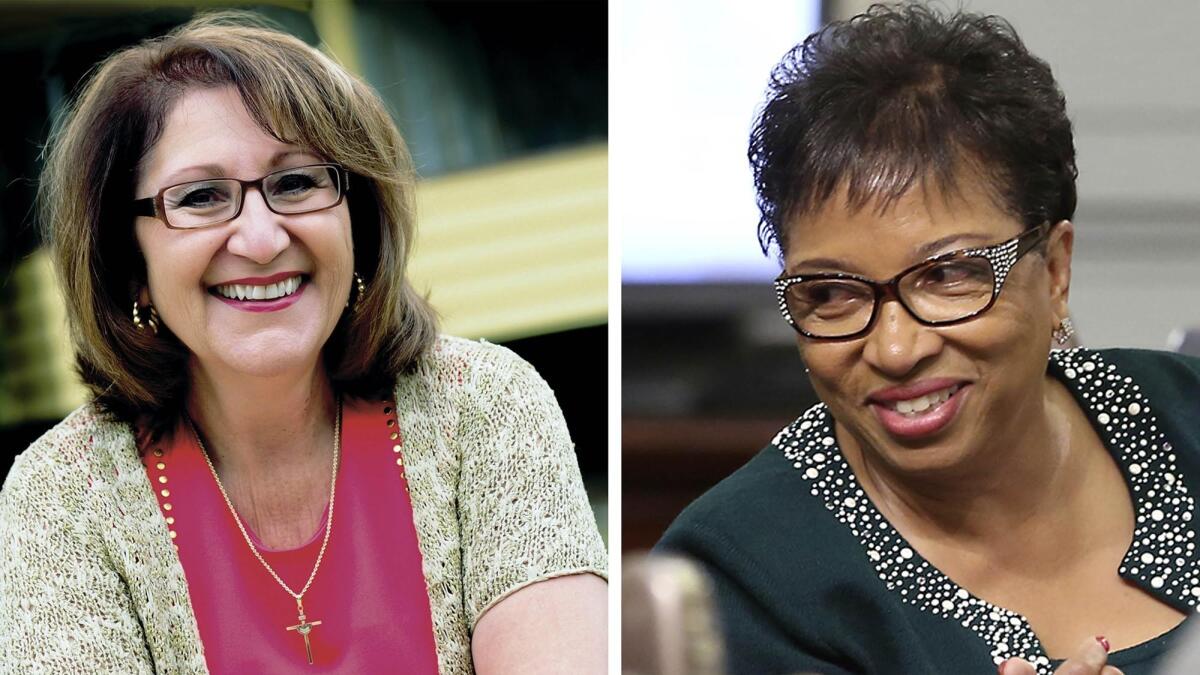
Assembly District 47 (San Bernardino)
The candidates: Assemblywoman Cheryl Brown (D-San Bernardino); attorney Eloise Reyes, a Democrat; and Republican businesswoman Aissa Sanchez
The aftermath of a climate change fight: Brown is facing one of the most contentious reelection fights this year against Reyes, who is positioning herself to the left of the two-term Democrat. The election is taking shape as a battle between progressive groups and more moderate, business-allied forces over what kind of Democrat will represent voters in the district. A handful of labor unions that backed Brown in 2014 have defected and are now supporting Reyes. The attorney’s supporters have tried to cast Brown as the “oil candidate.” They’ve pointed to the thousands of dollars Brown has accepted from oil companies and her role in stalling a key provision of last year’s climate change bill that would have slashed petroleum use statewide.
They are after me, and I still don’t know why. I don’t know who ‘they’ are. But I will find out soon.
— Assemblywoman Cheryl Brown (D-San Bernardino), speaking to The Times in March about her reelection campaign
The money: Outside groups have dominated spending, dropping more than $2 million so far. Brown’s campaign has a significant cash advantage over Reyes and has benefited from most of the outside spending — mostly by oil companies, charter schools and real estate groups. A union-backed PAC has bolstered Reyes’ campaign. Business-aligned groups supporting Brown also have spent thousands to support the race’s only Republican, Sanchez, who has no prior political experience and has raised no money, possibly in an attempt to knock Reyes out of the top-two primary.
Senate District 15 (Silicon Valley)
The candidates: Sen. Jim Beall (D-San Jose); Assemblywoman Nora Campos (D-San Jose); and business owner Chuck Page and retail clerk Anthony Macias, both Republicans
The rundown: Campos, who terms out of the Assembly this year, is challenging Beall in a move that is sure to increase tensions between the two houses. Two similar faceoffs were averted earlier this year after Republican Assemblywoman Kristin Olsen (R-Modesto) bowed out of a race against business-allied Sen. Cathleen Galgiani (D-Stockton), and Sen. Marty Block (D-San Diego) said he would not seek reelection against outgoing Assemblywoman Toni Atkins (D-San Diego).
The money: Unlike Atkins, Campos enters this race with a significant fundraising disadvantage, having raised less than a quarter of Beall’s war chest. An oil industry-supported PAC is supporting Campos, but groups including Tom Steyer's NextGen environmental advocacy group, the construction industry and California Realtors have rallied to flood the campaign in Beall’s defense.
Anything could happen in these wide-open races
Assembly District 4 (Northern California)
The candidates: Davis Mayor Dan Wolk; Winters Mayor Cecilia Aguiar-Curry; Yolo County Supervisor Don Saylor; Elmer Mark Kropp; and Charlie Schaupp, a retired Marine officer and the lone Republican
------------
FOR THE RECORD:
June 2, 1:25 p.m.: An earlier version of this article indicated that Elmer Mark Kropp was the Republican candidate in the District 4 Assembly race. Charlie Schaupp is the GOP candidate.
------------
The rundown: Four Democrats and one Republican are running for this seat, vacated by Assemblyman Bill Dodd (D-Napa), who is running for Senate. Among the front-runners are Wolk, son of outgoing Sen. Lois Wolk (D-Davis), who ran for this seat in 2014, Saylor and Aguiar-Curry, all elected officials in Yolo County, home to most voters in the district. While Democrats enjoy a 20-point voter registration edge in the district, the crowded field means that Schaupp, the lone Republican, might have a shot at making the runoff if the other candidates split the Democratic vote.
The money: Wolk and Saylor have pulled ahead in fundraising, but Aguiar-Curry has benefited from some of the biggest independent expenditures in the state, with nearly all of the race’s $2.1 million in outside spending done to support her and oppose Wolk. Aguilar-Curry told The Times the support from oil and tobacco companies has been “awkward” for her.
Assembly District 27 (Silicon Valley)
The candidates: Former San Jose City Councilwoman Madison Nguyen; San Jose City Councilman Ash Kalra; Cong Thang Do, an engineer; school board member Darcie Green; attorney Esau Herrera; college professor Andres Quintero; and school trustee Van Le, the only Republican
The rundown: Seven candidates are running for this safe Democratic seat, which opened when Assemblywoman Nora Campos (D-San Jose) announced her run for state Senate. Nguyen and Kalra have emerged as front-runners, but with such a long list of hopefuls — and with large Vietnamese and Latino voting blocs — the electorate could splinter in unexpected ways.
The money: Kalra and Nguyen are about even in fundraising, but their campaigns have been dwarfed by a deluge of independent expenditures exceeding $2.1 million. Most of the money supporting Kalra comes from the construction industry and labor unions, while the California Charter Schools Assn. donated $1.2 million to support Nguyen and oppose Kalra.
Assembly District 43 (Glendale)
The candidates: Four Democrats: Glendale City Councilwoman Laura Friedman; Glendale City Clerk Ardy Kassakhian; Rajiv Dalal, a nonprofit executive director; teacher Andrew Blumenfeld; and Dennis Bullock, a former private school dean; retired Army Gen. Mark MacCarley and businesswoman Alexandra Bustamante, both Republicans; and former detention officer Aaron Cervantes, running with the American Independent Party
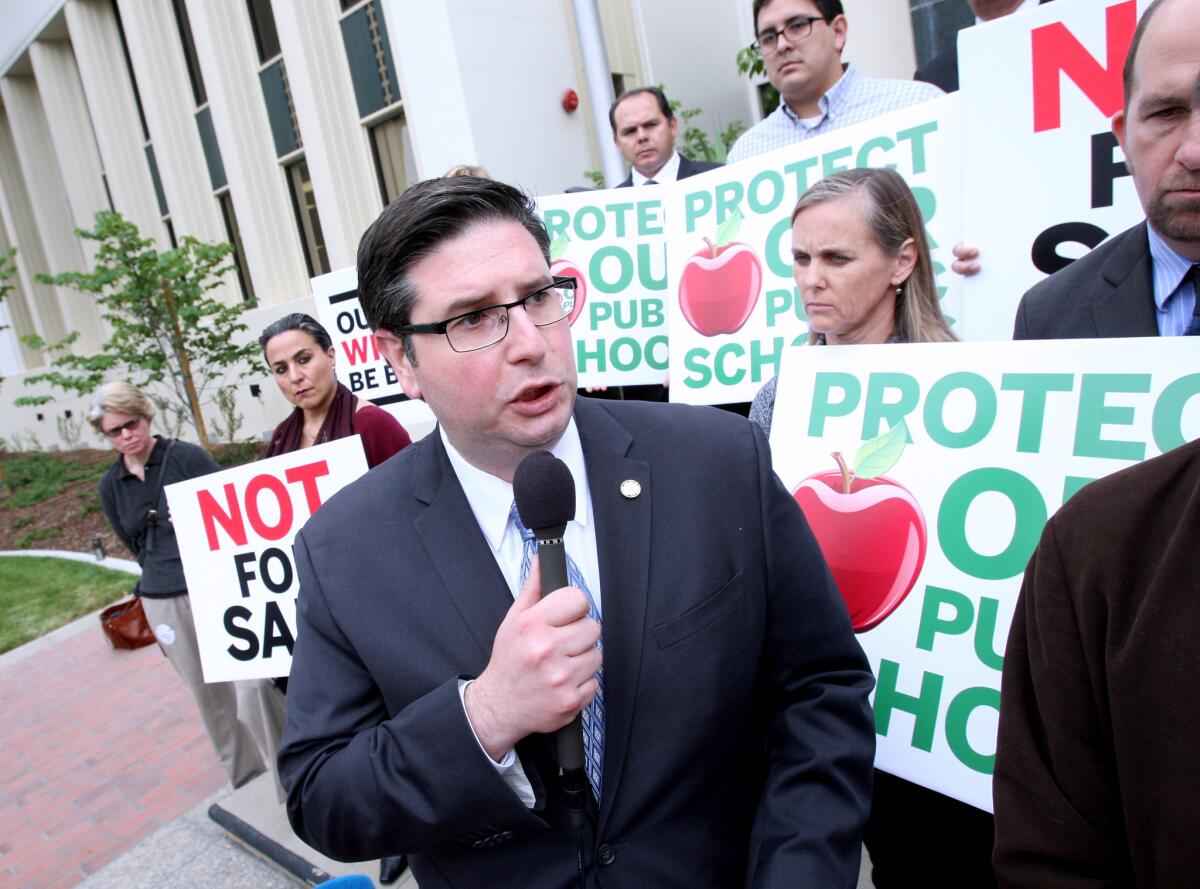
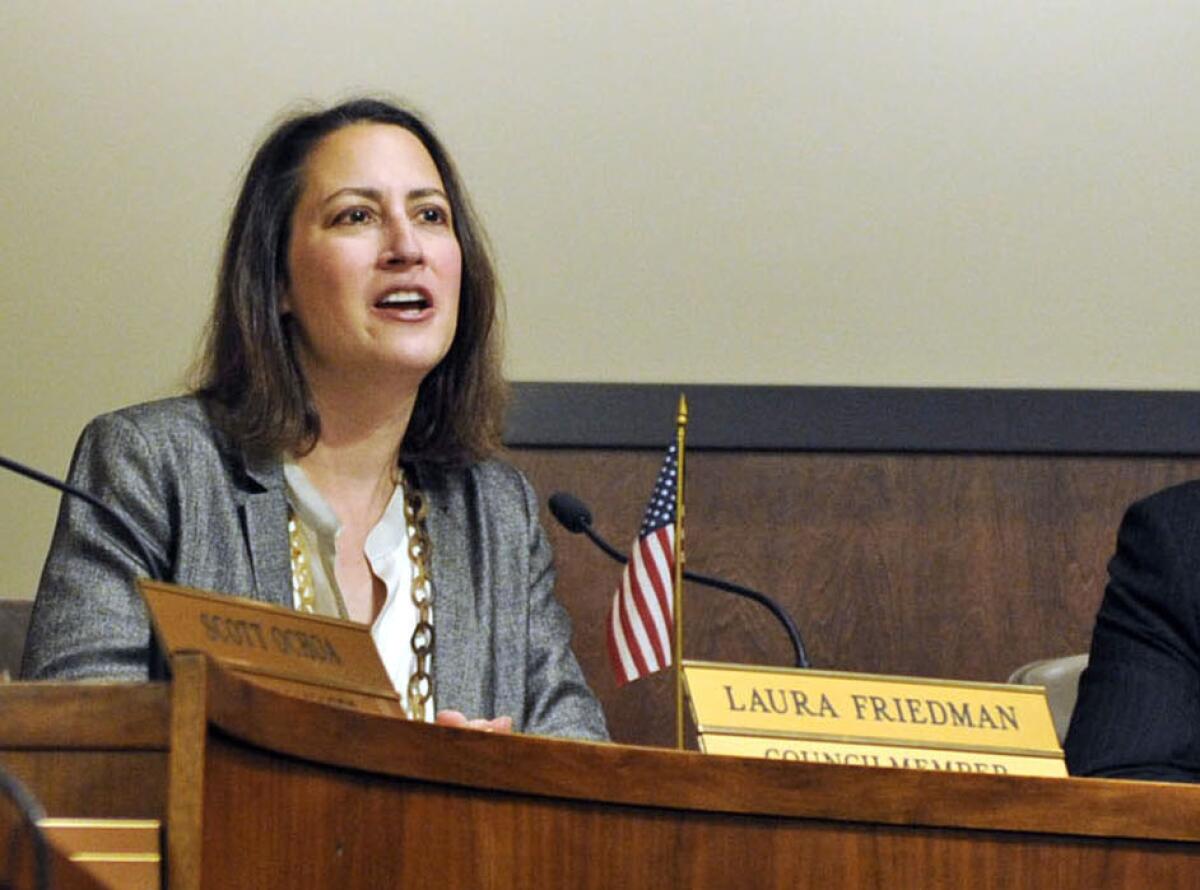
Another education proxy war: Kassakhian and Friedman have emerged as the Democratic front-runners and are at the center of what has become a major fight between teachers unions and charter school groups. The California Charter Schools Assn. has bankrolled a committee supporting Friedman, sending out a deluge of mailers attacking Kassakhian. Kassakhian, a second-generation Armenian American, has gotten help from the California Assn. of Realtors and teachers unions and could enjoy a substantial boost from Armenian voters, who make up 17% of registered voters in the district and are a well-organized voting bloc. Friedman has emphasized her status as the most visible female candidate in the race at a time when women are losing ground in California politics.
The money: Friedman, Kassakhian and Dalal have raised more than a half-million dollars each, but Dalal’s contributions have dropped off significantly since last year. He was frank with The Times about his slim chances for success. Still, with so many candidates, Dalal or the race’s most visible Republican, MacCarley, could slip through to the November election. Outside spending has topped $1.7 million, with most of it going to support Friedman and oppose Kassakhian.
Senate District 25 (Pasadena)
The candidates: L.A. County Supervisor Mike Antonovich; former Assemblyman Anthony Portantino; retired Pasadena Police Lt. Phlunte Riddle; business owner Chris Chahinian; businessman Teddy Choi; and business owner Katherine Perez-Estolano
The rundown: Before he dropped out of this race, Assemblyman Mike Gatto (D-Glendale) had amassed more than $2 million and was the favorite to win. Now, Antonovich, the only Republican in the race and a well-known local official, is almost guaranteed to face off with one the Democrats, who are battling for votes in this left-leaning district. Riddle has the backing of outgoing incumbent Sen. Carol Liu (D-La Cañada Flintridge) and several other female legislators, while Portantino has earned the endorsement of the California Democratic Party.
The money: Portantino has a major advantage in fundraising, and he and Antonovich have the biggest cash reserves going into the primary. Antonovich also has been boosted by an independent expenditure funded entirely by a real estate developer. Perez-Estolano has benefited from spending by a Latino caucus PAC.
Senate District 27 (Ventura)
The candidates: Henry Stern, environmental attorney and policy advisor to Sen. Fran Pavley (D-Agoura Hills); Shawn Bayliss, legislative deputy for L.A. City Councilman Paul Koretz; nonprofit director Janice Kamenir-Reznik; Moorpark City Councilman David Pollock; George C. Thomas, publisher of the Van Nuys News Press; and business owner Steve Fazio
The rundown: In this fight to replace Pavley, a key figure in the progressive, pro-environment wing of the state Democratic Party, Kamenir-Reznik entered the race late, scrambling the field. She earned the endorsement of former L.A. County Supervisor Zev Yaroslavsky and Supervisor Sheila Kuehl, both of whom switched their support from Stern after she entered. The California Democratic Party has declined to make an endorsement here, and Fazio, the lone Republican in the race, is likely to advance alongside the Democrat who comes out on top.
The money: The candidates have collectively raised more than $2.8 million, with Stern and Kamenir-Reznik in the lead. Outside groups have spent an additional $900,000, most of it from labor unions supporting Stern and business groups rallying behind Kamenir-Reznik.
Rematch: Former lawmakers seek to regain seats
The 2014 election saw a handful of first-term Democrats lose their seats to challengers. The roles are now reversed as these ousted members attempt to reclaim their seats.
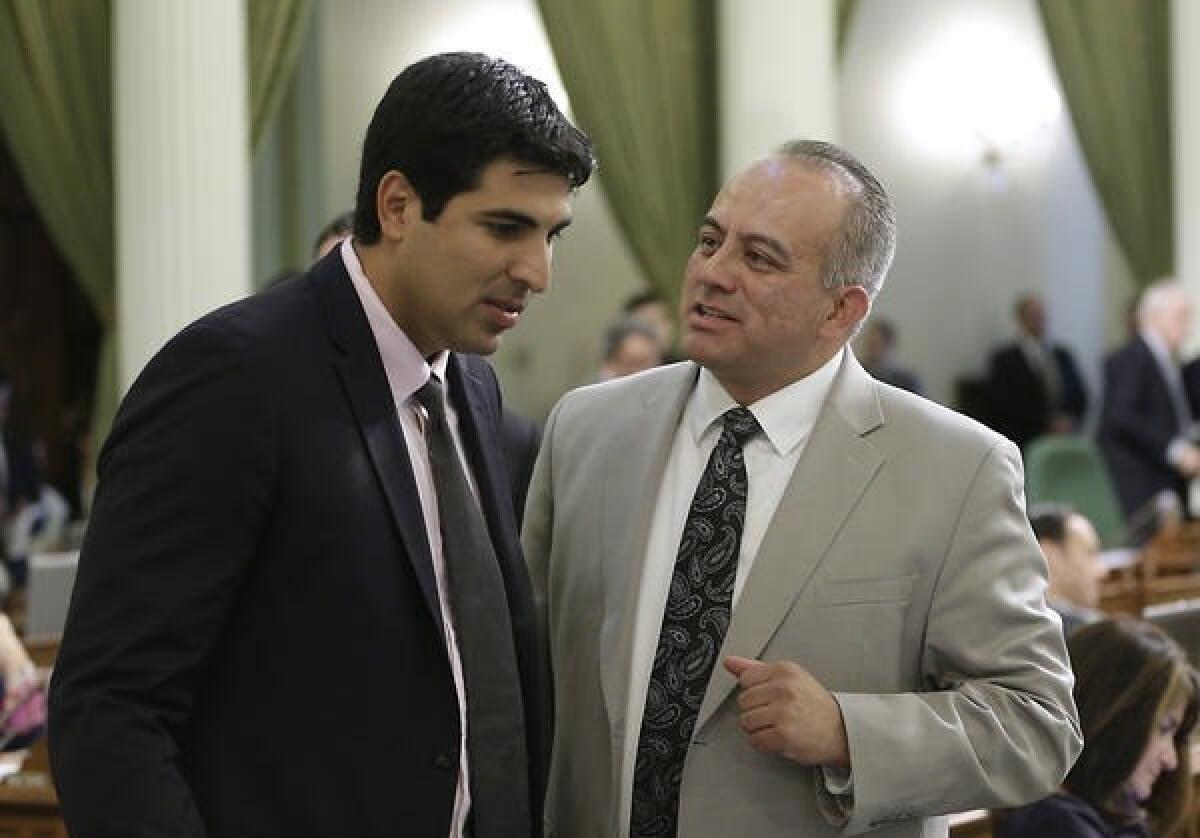
Assembly District 39 (San Fernando Valley)
The candidates: Assemblywoman Patty Lopez of San Fernando; former Assemblyman Raul Bocanegra; Mina Creswell, college administrator; San Fernando Mayor Joel Fajardo; former San Fernando City Councilwoman Joanne Baltierrez-Fernandez; and teacher Kevin Suscavage (all Democrats)
The unlikely incumbent: Lopez has been on the defensive for months, fighting calls to step down shortly after she scored the biggest upset last cycle. She beat Bocanegra by just 466 votes after minimal campaigning, and her improbable win became a cautionary tale for incumbents on the dangers of running a complacent campaign. As a result, many more lawmakers who appear to be safe reelection bets have been stockpiling campaign funds this year, observers say. Despite proving to be one of the most reliable Democratic votes in the Legislature, many of Lopez’s colleagues have coalesced around Bocanegra, who also has the backing of the California Democratic Party.
The people put me in this place.
— Assemblywoman Patty Lopez (D-San Fernando), who has resisted calls for her to step down
The money: Lopez trails Bocanegra in spending by a 10-1 ratio. Outside groups including oil companies and the California Charter Schools Assn. have spent more than a half-million dollars in the primary, supporting Bocanegra and opposing Lopez. With Democrats making up more than half of registered voters, the November election likely will be a rematch between Lopez and Bocanegra and could blow much of the conventional wisdom about an incumbent’s advantage out of the water.
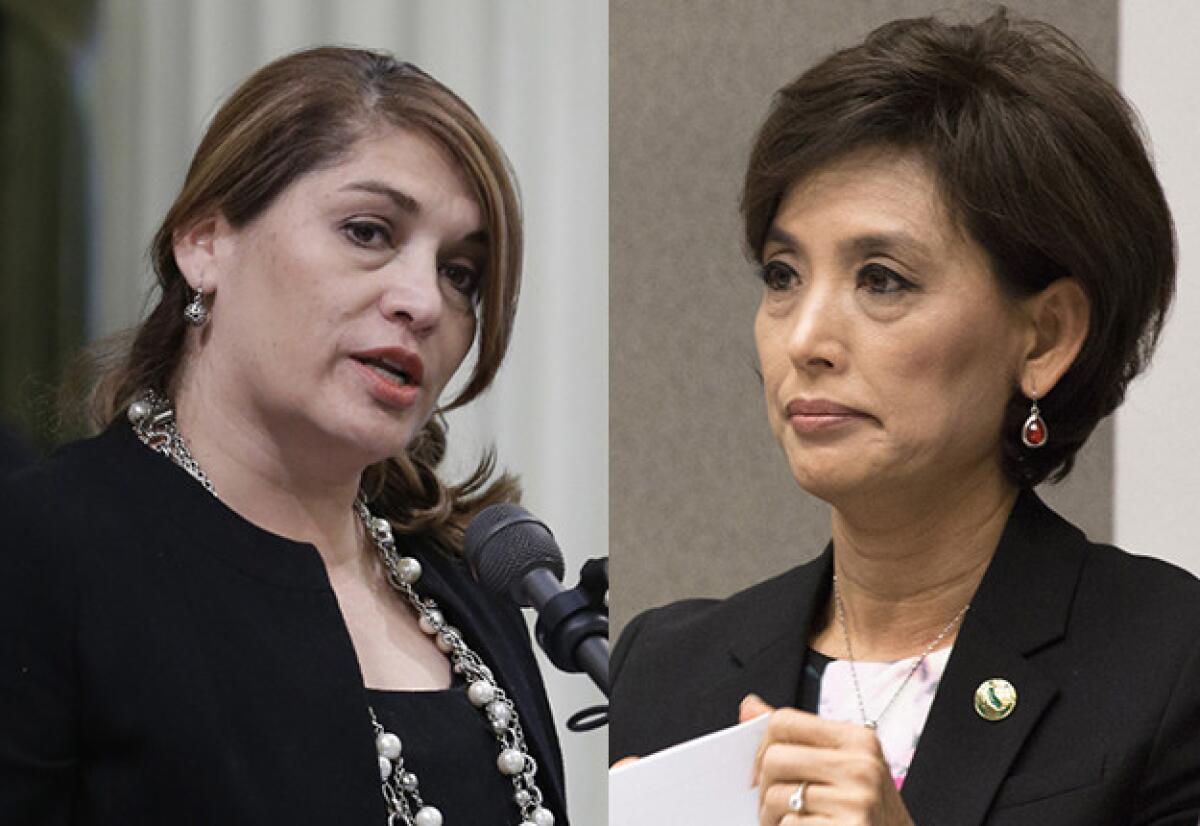
Assembly District 65 (Orange County)
The candidates: Assemblywoman Young Kim (R-Fullerton); and former Assemblywoman Sharon Quirk-Silva, a Democrat
The rundown: This district has been up for grabs between the two parties in the past few elections. Quirk-Silva was first elected in 2012, beating out GOP incumbent Chris Norby by just four points. Quirk-Silva lost the seat to Kim in 2014 in a costly race where spending approached $7 million. In a district where Democrats and Republicans are virtually tied in voter registration, the seat is likely a top priority for Assembly Republicans to defend — and for Democrats to try to recapture.
The money: Quirk-Silva, who now teaches elementary school, has raised less than half of Kim’s $1.1 million, but the teacher’s unions and environmental groups that supported Quirk-Silva last time could be lying low until after the primary.
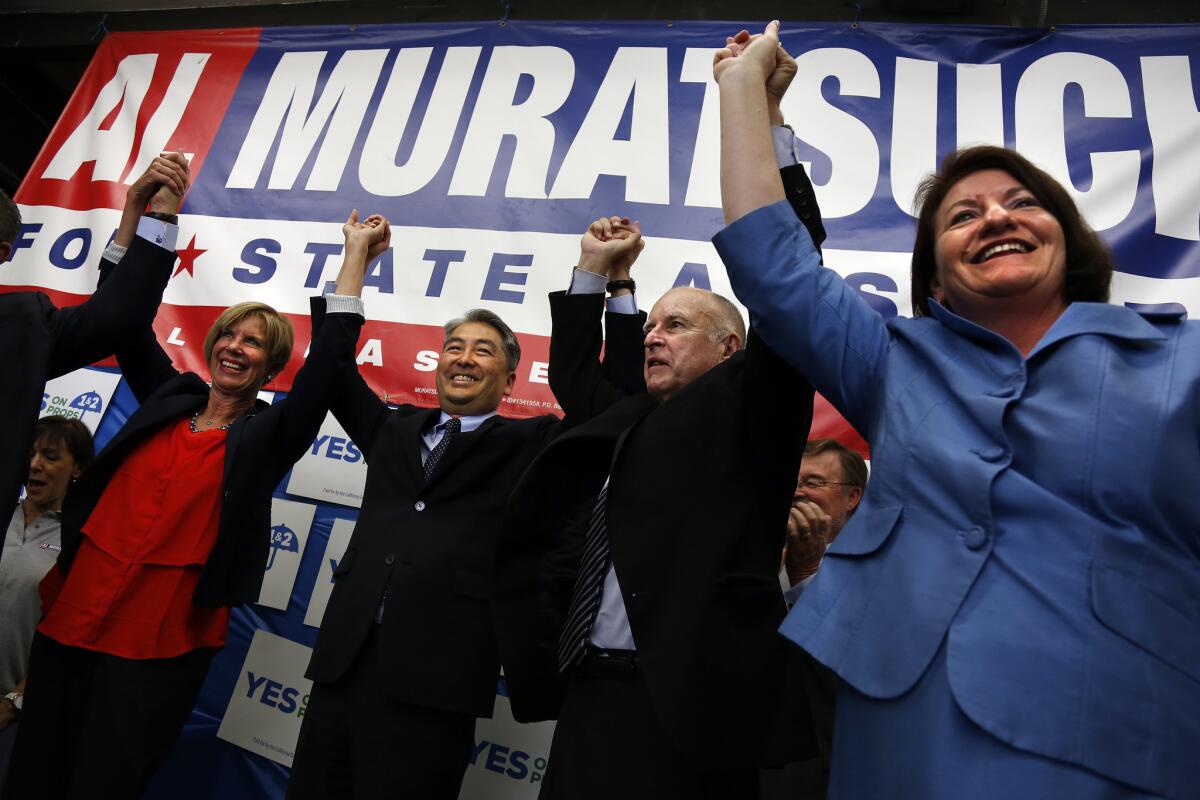
Assembly District 66 (L.A.’s South Bay)
The candidates: Assemblyman David Hadley (R-Manhattan Beach); and former Assemblyman Al Muratsuchi and retail manager Mike Madrigal, both Democrats
The rundown: Hadley narrowly won this competitive district in 2014, ousting Muratsuchi by a little over 700 votes. During an election year dominated by Trump and in a district that has historically favored moderates, Muratsuchi’s campaign has set up a website called hadleytrump.com with audio and video of Hadley being confronted about whether he will support the Republican presidential front-runner.
The money: Political observers have said Hadley is possibly the most vulnerable Republican in the Legislature, and his $1.4 million in fundraising could be evidence he agrees. Muratsuchi has far less money banked than his Republican opponent, but all signs point to an expensive all-out battle between Democrats and Republicans if these two advance to November as expected. Madrigal has raised no money so far.
Democrats’ best shots at a supermajority
Democrats need to pick up at least three seats in the Assembly, on top of maintaining recent gains, to get to a supermajority. In the Senate, Democrats need to flip only one seat from red to blue to reach the two-thirds threshold, which would give Democrats a virtual free pass to propose and pass new spending or place issues on the ballot.
Two of the rematches between Democrats who were ousted last cycle and Republican incumbents may prove fruitful for the majority party, but here are a few others:
Assembly District 16 (East Bay)
The candidates: Assemblywoman Catharine Baker (R-San Ramon); and teacher Cheryl Cook-Kallio, a Democrat
Both sides take aim: Both conservative interest groups and the Democratic leadership have made it clear that this is a top priority for 2016. Assembly Speaker Anthony Rendon (D-Paramount) said earlier this year that this is a “top pickup opportunity” for Assembly Democrats and promised to spend what it takes to win the seat. Democrats likely see this race as their best chance to take back one of the three seats they need to restore their supermajority in the lower house. The district, which is centered on Contra Costa County, has a slight Democratic edge in voter registration. Baker has built a record as a fiscal conservative and a social moderate, bucking the GOP to vote for Gov. Jerry Brown’s climate change legislation and co-authoring California’s mandatory vaccination bill.
The money: Baker has raised nearly $1.6 million this election, more than three times her opponent. Business and interest groups, including one funded largely by businessman Charles Munger, have spent nearly a half-million dollars in independent expenditures to back Baker and oppose Cook-Kallio. Labor unions, which spent more than $1.8 million supporting the last Democrat who faced Baker, have yet to kick in the same funding this time. But with just two in the race, Democrats and their allies could be saving up to spend big come November.
Senate District 21 (Antelope Valley)
The candidates: Assemblyman Scott Wilk (R-Santa Clarita); Democrats Jonathon Ervin, an engineer; and Steve Hill a comic; and Republican business owner Starr Moffatt
An eleventh-hour opening: The last-minute announcement by Sen. Sharon Runner (R-Lancaster) that she would not seek reelection because of health reasons opened up this competitive inland L.A. County district where Republicans and Democrats are nearly evenly split. Wilk threw his hat in the day after Runner bowed out and has received substantial support from the state GOP in his bid to keep this seat in their column. The California Democratic Party and Senate Pro Tem Kevin de León have endorsed Ervin, an engineer and Air Force reservist who formerly served on the Lancaster Planning Commission. Moffatt, who recently revealed on her campaign website that she posed for nude photos in the past, and Hill, who has raised about $5,200 this cycle, are not expected to mount viable campaigns.
The money: Despite his late entry, Wilk has raised more money, spending nearly $200,000 and receiving support from a wide range of business groups. Oil companies and the real estate industry have spent an additional $210,000 opposing Ervin and promoting Wilk. This race looks like it will be decided in November, so depending on the outcome of other races June 7, Democrats could be gearing up for an expensive fight over this seat.
Senate District 29 (Orange County)
The candidates: Assemblywoman Ling Ling Chang (R-Diamond Bar); and two Democrats: former Irvine Mayor Sukhee Kang and nonprofit founder Josh Newman
The rundown: The two Asian American front-runners on opposite sides of the aisle will likely battle it out through November in a purple district where Asians make up 20% of registered voters. Kang, who emigrated from Korea in the 1970s, served as Irvine’s mayor from 2008 to 2012 and unsuccessfully challenged then-Rep. John Campbell in the 45th Congressional District. The Democratic establishment, including Lt. Gov. Gavin Newsom and Rep. Alan Lowenthal (D-Long Beach), has lined up to endorse Kang for this seat, where Republicans hold a 37%-34% voter registration advantage. Senate District 29 includes much of Chang’s current Assembly district.
The money: Kang has struggled to keep pace with Chang’s fundraising, but the two candidates have spent roughly the same amount. Chang has benefited from independent expenditures from the California Assn. of Realtors and the California Dental Assn. Newman is trailing his opponents significantly in fundraising.
For more on California politics, follow @cmaiduc.
ALSO:
In this Glendale Assembly district, Armenian Americans could be key
Independent expenditures 101: An introduction to outside spending in state races
Updates on California politics
Get the L.A. Times Politics newsletter
Deeply reported insights into legislation, politics and policy from Sacramento, Washington and beyond. In your inbox three times per week.
You may occasionally receive promotional content from the Los Angeles Times.








